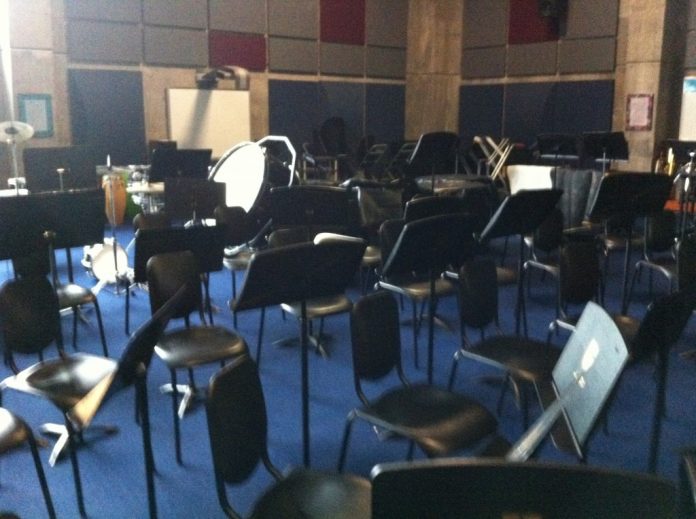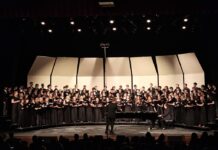Want to know the best kept Jesuit secret? It’s not a secret passageway, a hidden underground tunnel, or a discreet study spot. It’s a class: Advanced Musicianship!
Advanced Musicianship is one of Jesuit’s least taken classes, yet it is one of the most rewarding. Taught by Mrs. Morton for years, the class thoroughly explores the fundamental nature of music, including sound, chords, melody, and theory. According to the Jesuit course description of the class, it is “an in-depth study of music theory, ear training, counterpoint, keyboard harmony, and analysis of both classical and contemporary musical forms.” Though this may sound boring, both current and former students alike rave about the course.
Current student Paul Scott ’14 calls the course his “most enjoyable class at Jesuit,” emphasizing that “it’s not a blowoff class. There are plenty of times where the concepts blow me away and are very hard to grasp. But my love of music makes it the class I can’t wait to go to. I always want to go to the class and learn, so my knowledge in music can grow.”
The class, formerly taught by Mr. Donovan Putnam, at one point had as few as one student, and as many as nine. Mrs. Morton likes the smaller class size, calling a nine person class “too many.” Scott shares the same viewpoint, explaining that “being such a small class, [Mrs. Morton] teaches us on a very personal basis and makes sure we each understand the concepts.”
A typical day includes a lot of lecture (structure of chords, melody, and rhythm), ear training (tone, pitch, and key signatures), listening to music, and identifying chords and notes. According to Mrs. Morton, “nobody gets to take a nap.”
Because of the curriculum, guitar and piano players often excel in the class. These musicians are already used to dealing with chords and techniques that they have already dealt with but didn’t know what to call them.
Mrs. Morton usually likes to deal with musicians with similar music knowledge, which is why the course prerequisite is that students “must be able to demonstrate proficiency in reading music and playing an instrument.” This is due to the reasoning that students, who have not been previously exposed to reading music, would be “overwhelmed,” said Mrs. Morton, who compared learning to read music to “learning a new language.” Because of the “upper-level” concepts covered, she states that you’re “not going to find a freshman in [Advanced Musicianship].”
Mrs. Morton prefers to stay on one topic until everyone grasps it, explaining how “everything builds on the last step.” If a student doesn’t understand one step, it hurts them on all future concepts. Often one student will be great on one subject, while another will have difficulty grasping it.
Meanwhile, on another subject, the student who struggled with the previous lesson may fully grasp it. Because of this, the playing field is relatively level, and students who better understand concepts can help those having more trouble with them. To further help students’ comprehension of material, Mrs. Morton tries to reinforce ideas through practice. Since there is a limited amount that she can teach during class, there is a little bit of homework each night to help drill ideas into the students’ heads. Some is written, while some is done online.
One common assignment consists of students working on a website, which drills them on note identification and on what chords look like. The website, music theory.net, helps them practice what they learned in class. It can be used on iPad, but it costs money, so most students use it on their home PCs. Mrs. Morton stresses to her students that “five minutes a day works wonders” in their musical development.
Advanced Musicianship is a four-day class, not meeting on Wednesdays for Senior Service. Right now, the class just operates during the spring semester, but Mrs. Morton is hoping that they will be able to create a fall semester class next year. During this semester, she teaches two classes, one of which is an independent study. Senior Will Patterson ’13 could not get into the normal class because his schedule would not work, so Mrs. Morton started the daily one-on-one session.
He is a bit further along than the others, as Mrs. Morton can give him completely individual attention. She describes Will’s ear as “amazing” and even “better than [hers].” He is on the “fast-track” of the course and will probably be able to advance farther in the curriculum than the members of the normal class.
One of the class’s distinguished alumni is Mr. Max Von Schleinreid, one of Jesuit’s physics teachers. Another is Mr. Jonathan Bailey, who works with the drum line of the Jesuit Ursuline Ranger Band. Often, Mrs. Morton uses musicians from her class to play during Mass on Fridays.
The grading system of the class is based on participation. As she doesn’t want students to “hate [Advanced Musicianship],” Mrs. Morton tends to grade them for effort rather than accuracy. The main objective of the class is for students to be able to be able listen to music differently once they leave the class. Paulo Salazar ’13, a former student, attests to the success of the class, saying that he “definitely pay[s] attention more to the tune and the key signatures” of music than he ever did before taking Mrs. Morton’s course.
People take Advanced Musicianship for a variety of reasons. Some take it to improve their musical ability, hoping to major in music in college someday. Others join the class because they have deeper desires to explore music, more than those who simply want to receive their fine arts credit. Still, others desire to improve their music skills to apply them to their instruments, such as guitar and piano.
Paulo did it because of his “music interests [him] and [he] wanted to become knowledgeable with music theory.” Oddly, not many band and/or orchestra members choose to take the course, according to Mrs. Morton. When asked what she would say to students considering taking Advanced Musicianship, she replied that, after finishing the class, “you just don’t ever listen to music the same way.” Students never believe it on the first day, yet they realize that it is true as the semester progresses.
Mrs. Morton further emphasizes that if you are a musician, the class will fit in with what you already know. She says that the class is not hugely stressful, but does cover lots of information. In addition, she mentions that you should not take it if you don’t know anything about music. Finally, she adds that she will be “glad to talk to anybody about it.”
So, if you are a musician looking for an engaging and interesting class to take next year to not only satisfy your fine arts credits, but also to increase your understanding of music theory, Advanced Musicianship is for you! Consider this your invitation to think about taking the class next year. You can be a part of the best kept Jesuit secret – and it will change the way you listen to music for the rest of your life.






